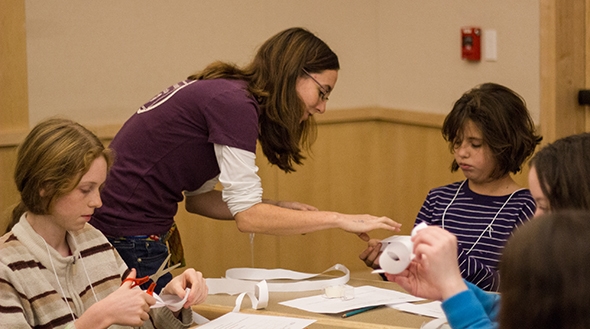By Lisa Lopez Snyder
With graph paper and pencils, crayons and paper strips, and pinecones and Brussels sprouts in hand, 82 Upper Valley middle and high school girls and their teachers participated October 20, 2012 in the Dartmouth Department of Mathematics’ Sonia Kovalevsky Math Day, a hands-on workshop aimed at inspiring future generations of female mathematicians.

In sessions held at Kemeny Hall and led by Dartmouth mathematics department instructors and students, the girls cut, colored, and twisted paper, and punched calculators. The activities were all designed to make learning math fun.
“The format helps girls think about math in a creative way,” says workshop coordinator Katie Kinnaird, a fifth-year PhD candidate.
The idea is simple—to make math accessible and yet introduce concepts that are fairly advanced. And, whether a young woman chooses to pursue a career in teaching, medicine, law, or just do math for fun, “it helps them become more critical thinkers and readers,” says Zajj Daugherty, a John Wesley Young research instructor in the Department of Mathematics, one of the event’s organizers.
In one session, the young students learned how to make Mobius strips—one-sided surfaces—created by giving a single strip of paper a half twist and then connecting and taping the two ends. In an activity on nature and numbers, the girls learned a progressive method of counting to analyze the spiral patterns in pinecones and to explore growth configurations, such as the distance between Brussels sprouts on a stalk.
The workshop’s focus on girls is intentional, says Rosa Orellana, associate professor of mathematics. “Without support or encouragement, young women’s interest in math often wanes after they encounter a challenging problem,” particularly in the transition between middle school and high school, and again between high school and college. “One of the messages we want to make is that, ‘yes, sometimes math is hard, but just because it is, doesn’t mean you can’t do it,’” she says.

Third-year graduate student Jennifer Harnish, who participated in an afternoon panel discussion, remembers how difficult her own journey was during her first year of college. “The math was so much harder than high school,” she says. “I thought maybe I was the only one who felt that way. But, in talking to other students, I realized I wasn’t alone.”
The math day is named for Sonia Kovalevsky, the first major Russian female mathematician, who, in 1874, became the first woman to receive a PhD in Northern Europe. Kovalevsky faced obstacles, too, says Orellana. “In Russia, women were not permitted to attend university, but Sonia had a tutor who recognized her talent, and who helped her get her PhD. This workshop is a way to give girls that same message—to not give up.”
Eleven-year-old Siddhi Bramhe called the math day “inspiring.” A sixth-grader at Lebanon Middle School, she says that being around other girls who like math “makes you feel good that you’re not alone.”
The workshop was sponsored by the Office of the Provost, the Dean of Faculty of Sciences, the Department of Mathematics, and the Association for Women in Mathematics through a grant from the National Science Foundation.

